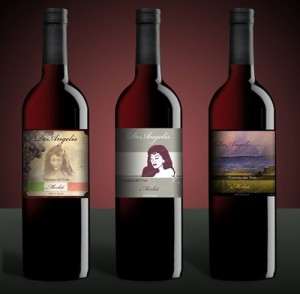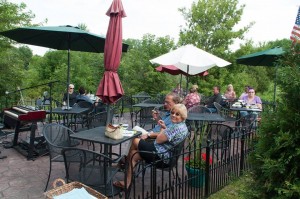Follow the Moon To Natural Wines
“All-natural” is a phrase frequently bandied about to describe many different products. To Rob and Stacey DeAngelis, it’s serious business. They’re the owners of DeAngelis Cantina Del Vino, a winery in Ann Arbor, Michigan. Their story is a made-in-the-Midwest success. First, a bit of history about Rob and Stacey before we explore what the term “natural wine” means. Then we’ll see how Rob applies the concept of natural wine to his wines.
 Rob DeAngelis comes to winemaking as many winemakers have, via his family. His maternal grandfather Virgilio Morrone, taught Rob to make wine by “following the moon” (more on this soon.) As an Italian immigrant in Dearborn, Michigan, Virgilio contributed to “the rivers of purple flowing down Dearborn driveways from home winemakers,” says DeAngelis recalling the the old days. (Dearborn is a large inner ring suburb of Detroit; the home of Henry Ford and the world headquarters of Ford Motor Company.)
Rob DeAngelis comes to winemaking as many winemakers have, via his family. His maternal grandfather Virgilio Morrone, taught Rob to make wine by “following the moon” (more on this soon.) As an Italian immigrant in Dearborn, Michigan, Virgilio contributed to “the rivers of purple flowing down Dearborn driveways from home winemakers,” says DeAngelis recalling the the old days. (Dearborn is a large inner ring suburb of Detroit; the home of Henry Ford and the world headquarters of Ford Motor Company.)
Back then, the preferred grape was Zinfandel, transported by rail from California. Rob’s grandfather believed that wine should be made according to nature and the natural ebb and flow of the seasons. As we’ll see, DeAngelis carries on the family tradition of producing wine the natural way in Michigan today.
Rob’s “bread and butter” business is not wine making, but his occupation is something winemakers the world over can easily relate to: heating and cooling. With three locations in the metropolitan Detroit area, he’s built a very successful career serving his heating and cooling customers. What DeAngelis really enjoys serving the public are his wines! With his wife Stacey, she’s a CPA (Certified Public Accountant) by day, and the business manager of the winery in her “spare time,” they have built a thriving wine business.
As Stacey tells it, “Over the years, Rob’s winemaking techniques really improved, and the wine was so delicious that people were literally begging Rob to sell it to them. He would refuse to sell it, but he always said anyone who wanted to drink our wine was welcome to come over to our house to share it with us.
Eventually, Stacey says these wine tasting house calls evolved into: “I know you’ll drink your wine with me, but I want to take it home and drink it later.”
As the begging for homemade wine became more aggressive, she couldn’t turn people down, so Stacy started sneaking bottles out of the house and giving it to friends for free without Rob’s knowledge. She used her accounting skills to make sure they never exceeded federal limits on home winemaking.
After years of giving wine away, Rob and Stacey finally decided to build a winery. They have been following their dream ever since their first vintage in 2010. During 2013, the DeAngelis’ opened a tasting room adjoining the winery. Now De Angelis Cantino Del Vino winery specializes in what they call “natural wines.”
Natural wines are wines that are produced without adding or removing anything during the winemaking process. However, many winemakers add just a bit of sulfur in the form of sulfites to preserve their wine, all the while describing the wine as natural. (Some sulfites occur naturally in wine as part of the fermentation process, however.)
Sulfur was used by the ancient Greeks to fumigate their homes and ships. Supposedly Ulysses, after returning from Troy, ordered his home fumigated with disinfecting sulfur and a fire! Way back in the day, they heated resin to use as a preservative to prevent wine from becoming vinegar. This heated resin or pitch was added to the wine in liquid, solid and powered form. This precursor to liquefied sulfur dioxide was used to preserve the wine just as sulfite is used today.
DeAngelis wines have very low levels of sulfites. As Rob says, “We’re all natural, absolutely no chemicals are added to our wines.”
Robs says this is a more challenging way to produce fine wine, but customer repsonses indicate the extra effort is worth it.
DeAngelis uses an ozonator to keep his wines and the winery “operating room clean.” (Ozone is a byproduct of pure oxygen and a very powerful oxidizer. Ozone use requires special winery safety practices. )
To stay chemical free, it’s critical to keep the winery extremely clean. Unlike many wineries, there are no fruit flies buzzing around in the summer, feasting on the remnants of the winemaking process. The facility is immaculate.
DeAngelis does not even add any acid to his wine, as is common practice with California and other warm climate wines. The wines are kept at a constant temperature of 58°F, except Rob may bring the temperature down to 55°F for the white wines. This temperature control requires virtually constant monitoring. There is no added sugar, no added sulfites, just “the juice” as DeAngelis likes to say.
Returning full circle to his roots, DeAngelis racks and bottles his wine only when the moon is full! This really isn’t that unusual when you consider the trend of biodynamic winemaking. Briefly, biodynamics follows the forces of the cosmos and the phases of the moon and planet positions. Taken a step further, it might even include burying cow manure in that cow’s horn and diluting it with water and spraying the mixture through the vineyard!
Does it work? The answer depends upon who you ask. Some of the world’s finest winemakers follow biodynamic practices, including Olivier Humbrecht of Alsace’s Zind-Humbrecht, Lalou Bize-Leroy of Domaine Leroy in Burgundy, and Peter Sisseck of Dominio de Pingus in Spain. Stellar company indeed!
The DeAngelis’s use only French barrels to age their wines. These medium toast barrels from California have been previously used only once. Rob states “we’re not looking to impart heavy tannins and oak flavors to our wines. We want to fruit to shine through. The barrels add roundness and complexity to the wines without the harsh tannins new oak can impart”.
Their winery produces all-natural red wines ranging from Merlot to Vinosesso, a blend of Cabernet Sauvignon, Merlot and Cabernet Franc, their best selling wine. Stacey comments that “the guys usually go for the Cabernet Sauvignon, while the ladies almost always choose the Vinosesso. If you’re a betting person you could take odds on this.”
The winery produces between 20,000 to 50,000 bottles per year. That’s about 1,600 to 4,100 cases a year, quite a bit of wine for a part-time operation! More wines are “in the works”, including a sparkling wine and two sweet wines.
Chuckling, both Stacey and Rob say that their customers frequently enjoy the all-natural wines because, “They say they can drink more (of the wine) without getting a hangover!” This age-old Italian tradition of “following the moon” is enabling Rob and Stacey to pursue their passion and provide all-natural wines to their customers.
7879 Jackson Road, Suite D
Ann Arbor, Michigan
(248) 854-5420


